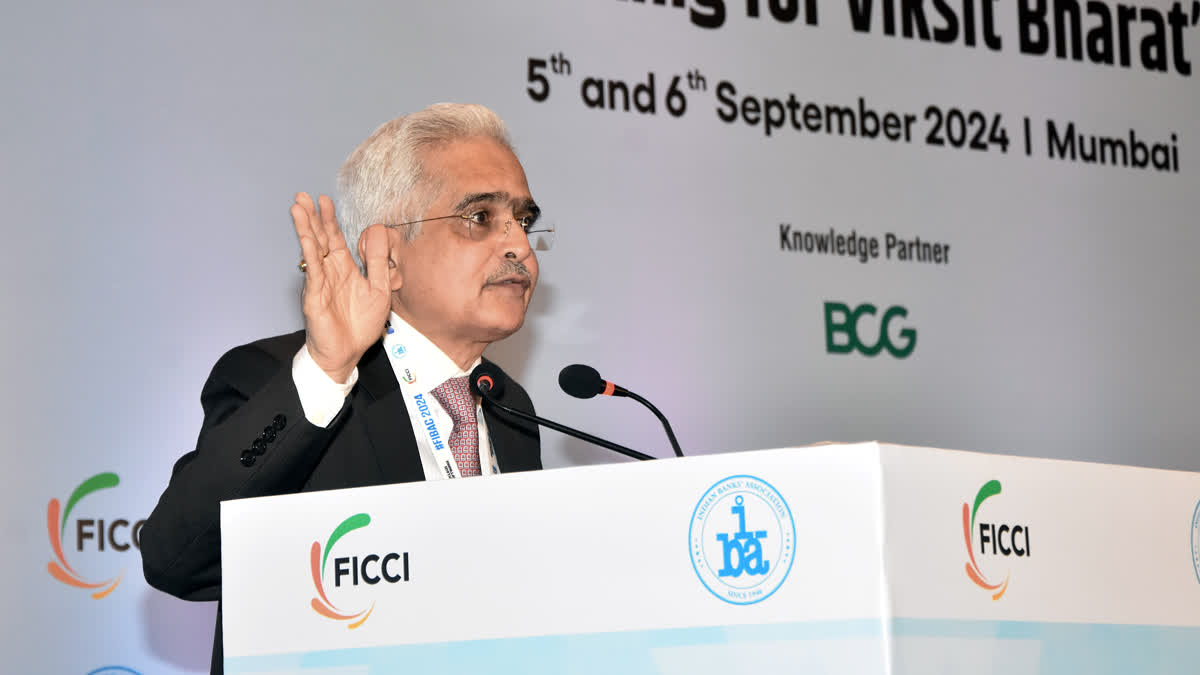Singapore: India's growth outlook reflects the underlying strength of the country's macro-fundamentals, with domestic drivers -- private consumption and investment -- playing a major role, RBI Governor Shaktikanta Das said on Friday. Moreover, the country's growth trajectory is supported by an environment of macroeconomic and financial stability, he said in a keynote address at the Future of Finance Forum 2024 organised by the Bretton Woods Committee, Singapore.
The Indian economy rebounded from severe contraction due to the COVID-19 pandemic and averaged real GDP growth of above 8 per cent during 2021-24. For 2024-25, the Reserve Bank of India (RBI) has projected the real GDP growth at 7.2 per cent, with risks evenly balanced around this forecast. "This growth outlook reflects the underlying strength of India's macro-fundamentals, with domestic drivers -- private consumption and investment -- playing a major role," he said.
On inflation, Das said it has moderated from a peak of 7.8 per cent in April 2022 to the tolerance band of +/- 2 per cent around the target of 4 per cent, but "we still have a distance to cover and can not afford to look the other way". The Reserve Bank's projections indicate that inflation is likely to ease further from 5.4 per cent in 2023-24 to 4.5 per cent in 2024-25 and 4.1 per cent in 2025-26, the Governor said.
The retail inflation based on the Consumer Price Index (CPI) remained below the Reserve Bank's median target of 4 per cent for the second month in a row in August at 3.65 per cent. It was at a five-year low of 3.6 per cent in July.
"Meanwhile, fiscal consolidation is underway and public debt levels are on a declining trajectory over the medium term. Corporate performance has improved strongly, enabling deleveraging and strong growth in profitability," he said.
The Governor further said that the balance sheets of banks and non-banking financial intermediaries, regulated by the Reserve Bank of India, have also strengthened.
"Our stress tests reveal that these financial intermediaries will be able to maintain regulatory capital and liquidity requirements even under severe stress scenarios," he said. Das also stressed that India's vision of global progress emphasises international cooperation that is people-specific, ambitious, action-oriented and decisive.
India's G20 Presidency in 2023 and its continuing contributions thereafter reflect New Delhi's vision of the world being one earth, one family with one future.
These priorities include strengthening the Multilateral Development Banks (MDBs) to address shared global challenges of the 21st century; achieving financial inclusion and productivity gains through digital public infrastructure; debt resolution for lower and middle-income countries; and financing cities of tomorrow, among many others, Das said.
"India remains committed to the reshaping of the global order in the decades ahead for the betterment of the world. It is now time for everyone to work for 'one future' for the entire mankind," he said.
On global financial stability risks, the RBI Governor said global financial markets have displayed resilience in recent months, with equity and bond yields rallying, volatility remaining low for the most part, and narrowing of corporate bond spreads, but there has been a sharp increase in prices of relatively riskier assets.
"While stocks have been supported by strong earnings, the narrowing of corporate spreads has coincided with rising episodes of corporate defaults," Das said, adding the current scenario also differs from past monetary policy tightening cycles when markets displayed risk-off sentiments and prices of riskier assets declined. He also noted that market expectations of higher interest rates in the United States (US) along with other factors, had kept the US dollar strong.
Governor Das also emphasised that reforming the international monetary and financial system is crucial for ensuring global economic stability, fostering growth, and mitigating systemic risks. The current system, while having supported decades of economic expansion, is increasingly challenged by imbalances and inefficiencies, including the dominance of a few currencies in global trade and finance, he said.
While reforms should address these imbalances to enable greater inclusion of emerging economies in global financial governance, they should also focus on strengthening the global financial safety net (GFSN), Das said.
Read More



